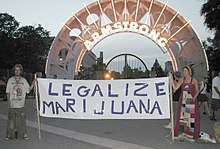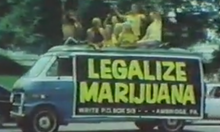Marijuana (word)
Marijuana, or marihuana, is a name for the cannabis plant and more specifically a drug preparation from it.[1][2][3] "Marijuana" as a term varies in usage, definition and legal application around the world.[4] Some jurisdictions define "marijuana" as the whole cannabis plant or any part of it,[5] while others refer to "marijuana" as a portion of the cannabis plant that contains high levels of tetrahydrocannabinol (THC).[6] Some jurisdictions recognize "marijuana" as a distinctive strain of cannabis, the other being hemp.[7] The form "marihuana" is first attested in Mexican Spanish; it then spread to other varieties of Spanish and to English, French, and other languages.[8][9]

Etymology
The term, originally spelled variously as "marihuana", "mariguana", etc., originated in Mexican Spanish.[9]
According to the Oxford English Dictionary, the term may come from the Nahuatl mallihuan, meaning "prisoner".[8] Author Martin Booth notes that this etymology was popularized by Harry J. Anslinger in the 1930s, during his campaigns against the drug.[10] However, linguist Jason D. Haugen finds no semantic basis for a connection to mallihuan, suggesting that the phonetic similarity may be "a case of accidental homophony".[11]:94 Cannabis is not known to have been present in the Americas before Spanish contact, making an indigenous word an unlikely source.[12]
Other suggestions trace the possible origins of the word to Chinese ma ren hua (麻仁花, lit. 'hemp seed flower'), possibly itself originating as a loan from an earlier semitic root *mrj "hemp".[13] The Semitic root is also found in the Spanish word mejorana and in English marjoram ('oregano'), which could be related to the word marihuana. This is also known in Mexico as "Chinese oregano".[12]
Additionally, traditional association with the personal name María Juana ('Mary Jane') is probably a folk etymology. The original Mexican Spanish used forms with the letter ⟨h⟩ (marihuana), and is famously used in the Mexican Revolutionary era (1910-1920) version of the lyrics of La Cucaracha. Forms using the letter ⟨j⟩ (marijuana) seem to be an innovation of English, and their later appearance in French and Spanish are probably due to English influence.[8][14]
English use
.jpg)

Early use of the term marijuana
The word entered English usage in the late 19th century. According to the Oxford English Dictionary, the first known appearance of a form of the word in English is in Hubert Howe Bancroft's 1873 The Native Races of the Pacific States of North America.[8] Other early variants include "mariguan" (1894),[12] "marihuma" first recorded in 1905, "marihuano" in 1912, and "marahuana" in 1914.[15]
The use of "marihuana" in American English increased dramatically in the 1930s, when it was preferred as an exotic-sounding alternative name during debates on the drug's use.[8] It has been suggested that in the United States the word was promoted by opponents of the drug, who wanted to stigmatize it with a "foreign-sounding name".[9] According to Lizzie Post, the word "marijuana" is deprecated because "in the early 1900s, the term marijuana was purposely used to negatively associate it with the Latino community."[16] The word was codified into law and became part of common American English with the passing of the Marihuana Tax Act of 1937.
Contemporary pop culture and counterculture use
From the portrayal in the media of marijuana use by the hippie subculture in the 1960s, the word became associated with revolutionary youth. By 1975, reggae artist Peter Tosh defended the use of marijuana in the song "Legalize It". Since then, the word has been associated with the stoner comedy genre, in films including the 1978 Up In Smoke and other media including the New York Off-Broadway show The Marijuana-Logues.[17][18][19][20][21]
Academic use
For legal, research and statistical reference, "marijuana" generally refers to the dried leaves and flowering tops (herbal cannabis), with by-products such as hashish or hash oil being uniquely defined and regulated.[22][23][24][25] Many legal references prefer the term "cannabis", for instance in the Single Convention on Narcotic Drugs. However, many laws and regulations often use the term "marihuana" or "marijuana", for instance the Controlled Substances Act in the United States. Cannabis reform organizations, such as the National Organization for the Reform of Marijuana Laws and Marijuana Policy Project, alongside political organizations like Help End Marijuana Prohibition Party of Australia and the Marijuana Party of Canada, also use this term.
See also
- Cannabis (etymology)
- List of names for cannabis
References
- Small, Ernest (2015), "Evolution and Classification of Cannabis sativa (Marijuana, Hemp) in Relation to Human Utilization", Botanical Review, 81 (3): 189, doi:10.1007/s12229-015-9157-3
- Clayton J. Mosher; Scott M. Akins (2013). Drugs and Drug Policy: The Control of Consciousness Alteration. SAGE Publications. p. 149. ISBN 978-1-4833-2188-2.
- Krishnan Vij (2008). Textbook Of Forensic Medicine And Toxicology: Principles And Practice. Department of Forensic Medicine and Toxicology, Government Medical College & Hospital, Chandigarh, India. p. 672. ISBN 978-81-312-1129-8.
- Tom Decorte (2016). World Wide Weed: Global Trends in Cannabis Cultivation and its Control. Routledge. p. 8. ISBN 978-1-134-78521-6.
- John Brick; Carlton K. Erickson (2013). Drugs, the Brain, and Behavior: The Pharmacology of Drug Use Disorders. Routledge. p. 101. ISBN 978-1-135-12219-5.
- Wayne Hall; Rosalie Liccardo Pacula (2013). Cannabis Use and Dependence: Public Health and Public Policy. Cambridge University Press. p. 13. ISBN 978-0-521-80024-2.
- R.N., Mary Lynn Mathre (1997). Cannabis in Medical Practice: A Legal, Historical and Pharmacological Overview of the Therapeutic Use of Marijuana. McFarland. p. 193. ISBN 978-0-7864-0361-5.
- "Marijuana". Oxford English Dictionary. June 2013.
- American Heritage Dictionaries (2007). Spanish Word Histories and Mysteries: English Words That Come From Spanish. Houghton Mifflin Harcourt. pp. 142–143. ISBN 978-0-618-91054-0.
- Booth, Martin (2005). Cannabis: A History. Picador. pp. 179–180.
- Haugen, Jason D. "Borrowed Borrowings: Nahuatl Loan Words in English" (PDF). Lexis: e-Journal in English Lexicology. 3: 63–106. ISSN 1951-6215. Archived from the original (PDF) on October 1, 2011. Retrieved August 8, 2011.
- Alan Piper, "The Mysterious Origins of the Word 'Marijuana'", Sino-Platonic Papers, 153 (July 2005)
- Weston La Barre, (1980) "History and Ethnography of Cannabis", in Culture in Context, Selected writings. Durham NC: Duke University Press.
- "Marijuana". Random House Webster's Unabridged Dictionary, V3.0, 1999.
- Dale H. Gieringer (2006), "The Origins of Cannabis Prohibition in California", Contemporary Drug Problems, Federal Legal Publication.
- "How to politely smoke weed". 26 July 2019.
- Haines-Saah, Rebecca J. (2013). "The privileged normalization of marijuana use – an analysis of Canadian newspaper reporting, 1997–2007". Critical Public Health. Taylor & Francis. 24 (1): 47–61. doi:10.1080/09581596.2013.771812. PMC 3919199. PMID 24574580.
- Pieter Coertzen, M Christiaan Green, Len Hansen (2015). Law and Religion in Africa: The quest for the common good in pluralistic societies. African Sun Media. p. 186. ISBN 978-1-919985-63-3.CS1 maint: multiple names: authors list (link)
- Braiker, Brian (April 28, 2005). "Chong's Bongs Gone Wrong". Newsweek.
- Belville, Russ (March 14, 2016). "'Marijuana' Is Not A Racist Word". High Times.
- Courtwright, David T. (2009). Forces of Habit. Harvard University Press. ISBN 978-0-674029-90-3.
- Dr Gary Potter; Mr Martin Bouchard; Mr Tom Decorte (2013). World Wide Weed: Global Trends in Cannabis Cultivation and its Control (revised ed.). Ashgate Publishing, Ltd. p. 17. ISBN 978-1-4094-9438-6.
- Mahmoud A. ElSohly (2007). Marijuana and the Cannabinoids. Springer Science. p. 151. ISBN 978-1-59259-947-9.
- Allan Tasman; Jerald Kay; Jeffrey A. Lieberman; Michael B. First; Michelle Riba (2015). Psychiatry, 2 Volume Set. Wiley. p. 4935. ISBN 978-1-118-75336-1.
- Reprinted from Journal of American Medical Association 201 (August 7, 1967): 368-71 (2012). "DEPENDENCE ON CANNABIS (MARIHUANA)". Drugtext.org. Retrieved January 30, 2016.
External links
| Look up marijuana in Wiktionary, the free dictionary. |
| Wikimedia Commons has media related to Marijuana. |
- The Mysterious Origins of the Word 'Marijuana', Alan Piper, Sino-Platonic Papers 153, 2005.